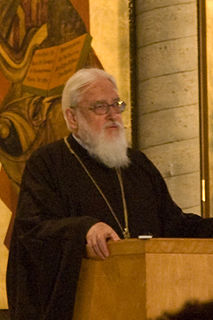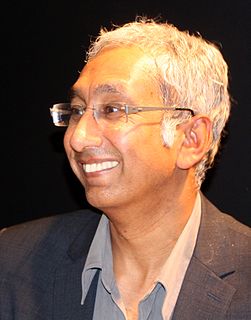A Quote by Rodney Stark
Theology necessitates an image of God as a conscious, rational, supernatural being of unlimited power and scope who cares about humans and imposes moral codes and responsibilities upon them, thereby generating serious intellectual questions such as: 'Why does God allow us to sin?' 'Does the Sixth Commandment prohibit war?'
Related Quotes
Systematic theology will ask questions like "What are the attributes of God? What is sin? What does the cross achieve?" Biblical theology tends to ask questions such as "What is the theology of the prophecy of Isaiah? What do we learn from John's Gospel? How does the theme of the temple work itself out across the entire Bible?" Both approaches are legitimate; both are important. They are mutually complementary.
God has made us humans in God's own image. So therefore the highest way to talk about God is by some kind of analogy with ourselves. So, naturally, if we who are finite and sinful suffer in multiple ways because of sin and evil and the horrible things that happen in our world, how much more does God, who is infinite, sinless, and knows the totality of all that happens to everybody, suffer pain and heartache at the suffering of his human and non-human creation - and be angry at all that causes it?
Fr. Amphilochios, the geronta or elder on the island of Patmos when I first stayed there, would have been in full agreement. Do you know, he said, that God gave us one more commandment, which is not recorded in Scripture? It is the commandment love the trees. Whoever does not love trees, so he believed, does not love God. When you plant a tree, he insisted, you plant hope, you plant peace, you plant love, and you will receive God's blessing.
Why pray? Evidently, God likes to be asked. God certainly does not need our wisdom or our knowledge, nor even the information contained in our prayers ("your Father knows what you need before you ask him"). But by inviting us into the partnership of creation, God also invites us into relationship. God is love, said the apostle John. God does not merely have love or feel love. God is love and cannot not love. As such, God yearns for relationship with the creatures made in his image.
It is precisely women’s experience of God that this world lacks. A world that does not nurture its weakest, does not know God the birthing mother. A world that does not preserve the planet, does not know God the creator. A world that does not honor the spirit of compassion, does not know God the spirit. God the lawgiver, God the judge, God the omnipotent being have consumed Western spirituality and, in the end, shriveled its heart.
Within each of us exists the image of God, however disfigured and corrupted by sin it may presently be. God is able to recover this image through grace as we are conformed to Christ. Just as the figure of David lay hidden within the marble, discernible only to the eye of its creator, so the image of God (however tarnished by sin) lies within us, see and known by God Himself. Yet God loves us while we are still sinners. He doesn't have to wait until we stop sinning. Acceptance of His love is a major step along the road that leads to our liberation from the tyranny of sin.
Faith stands or falls on the truth that the future with God is more satisfying than the one promised by sin. Where this truth is embraced and God is cherished above all, the power of sin is broken. The power of sin is the power of deceit. Sin has power through promising a false future. In temptation sin comes to us and says: "The future with God on his narrow way is hard and unhappy, but the way I promise is pleasant and satisfying." The power of sin is in the power of this lie.
Lots of people today would never consider themselves guilty of idolatry as far as it is spelled out in the Ten Commandments, but by reducing God to some benevolent "man upstairs" whose only attributes are love and tolerance, and who could not care less about sin, they truly have transgressed God's commandment. They have created a god in their mind who does not actually exist and will on the day of judgment, not be able to offer them any help.
Moral questions may not have objective answers-whether revealed by God or by science-but they do have rational ones, answers rooted in a rationality that emerges out of social need. That rationality can only be discovered through exercising the human potential for rational dialogue, the potential for thinking about the world, and for discussing, debating and persuading others. Values can never be entirely wrenched apart from facts; but neither can they be collapsed into facts. It is the existence of humans as moral agents that allows us to act as the bridge between facts and values.
When a man is in God's grace and free from mortal sin, then everything that he does, so long as there is no sin in it, gives God glory and what does not give him glory has some, however little, sin in it. It is not only prayer that gives God glory but work. Smiting on an anvil, sawing a beam, whitewashing a wall, driving horses, sweeping, scouring, everything gives God some glory if being in his grace you do it as your duty.
Jesus does not divide the world into the moral "good guys" and the immoral "bad guys". He shows us that everyone is dedicated to a project of self-salvation, to using God and others in order to get power and control for themselves. We are just going about it in different ways. Even though both sons are wrong, however, the father cares for them and invites them both back into his love and feast.
Thou shalt not, it is said, make unto thee any graven image of God. The same commandment should apply when God is taken to mean the living part of every human being, the part that cannot be grasped. It is a sin that, however much it is committed against us, we almost continually commit ourselves--Except when we love.
What is sin? It is the glory of God not honored. The holiness of God not reverenced. The greatness of God not admired. The power of God not praised. The truth of God not sought. The wisdom of God not esteemed. The beauty of God not treasured. The goodness of God not savored. The faithfulness of God not trusted. The commandments of God not obeyed. The justice of God not respected. The wrath of God not feared. The grace of God not cherished. The presence of God not prized. The person of God not loved. That is sin.
The cool thing about Watchmen is it has this really complicated question that it asks, which is: who polices the police or who governs the government? Who does God pray to? Those are pretty deep questions but also pretty fun questions. Kind of exciting. It tries to subvert the superhero genre by giving you these big questions, moral questions. Why do you think you're on a fun ride? Suddenly you're like how am I supposed to feel about that?





































